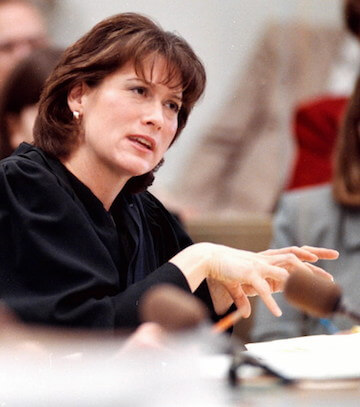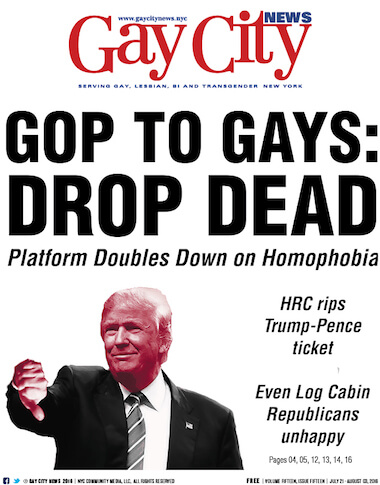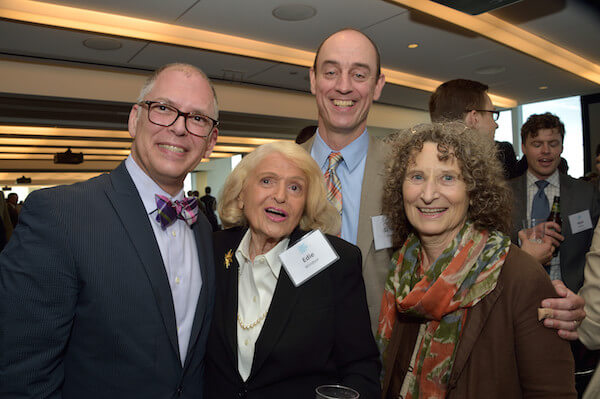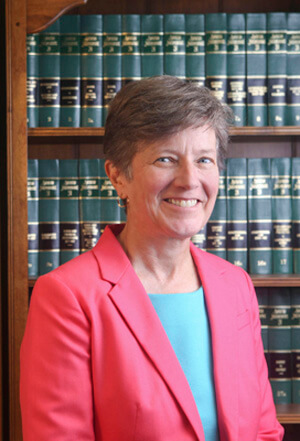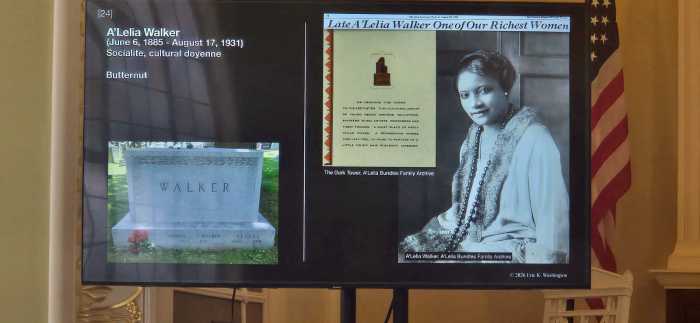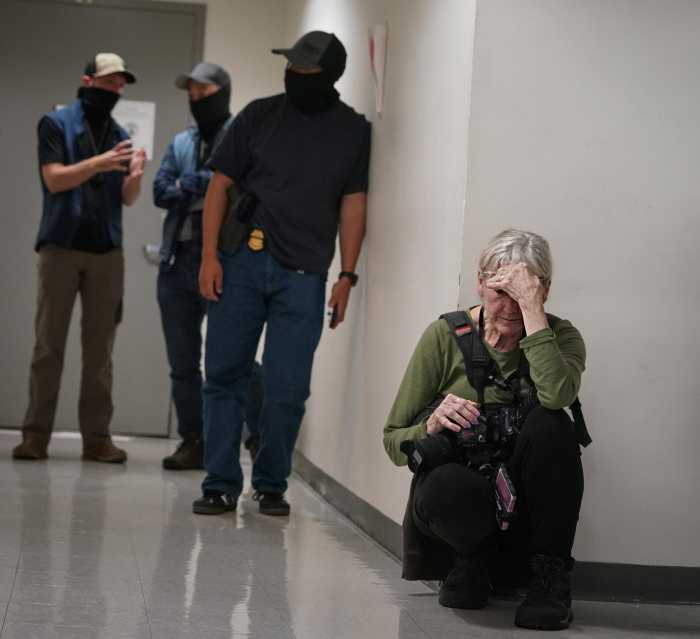Plaintiff Kimberly Hively and Lambda Legal’s Greg Nevins outside the federal courthouse in Chicago. | LAMBDALEGAL.ORG
The full bench of the US Seventh Circuit Court of Appeals, based in Chicago, substantially advanced the cause of gay rights on April 4, finding that Title VII of the 1964 Civil Rights Act prohibits employment discrimination based on sexual orientation.
Title VII applies generally to private sector employers with 15 or more workers as well as to many federal, state, and local government operations, and, though the statute’s text does not mention sexual orientation, the court found that discrimination against gay, lesbian, and bisexual people is a form of prohibited sex discrimination.
What is particularly amazing about the unprecedented decision in Kimberly Hively v. Ivy Tech Community College – the first such ruling by a federal appeals court – is that the Seventh Circuit is composed overwhelmingly of Republican appointees, many named as long ago as the Reagan administration.
Full bench concludes '64 Civil Rights Act's Title VII sex discrimination provisions apply
The lead opinion was written by Chief Judge Diane Pamela Wood, appointed by Bill Clinton, but the eight-member majority of the 11-judge bench included more Republicans than Democrats. Many of the judges in the majority could be generally characterized as judicial conservatives.
Wood’s opinion was joined by Frank Easterbrook (a Reagan appointee), Ilana Rovner (George H. W. Bush), Ann Claire Williams (Clinton), and David F. Hamilton (the only Obama appointee on the circuit). Richard Posner (a Reagan appointee) wrote a concurring opinion, as did Joel Martin Flaum (Reagan), his joined by Kenneth Francis Ripple (Reagan).
The dissent by Diane S. Sykes (a George W. Bush appointee) was joined by Michael Stephen Kanne (Reagan), and William Joseph Bauer (Ford).
The circuit’s decision to grant en banc review clearly signaled a desire to reconsider the issue, which Rovner had called for doing in her opinion for the three-judge panel that originally heard the case. At that time, Rovner made a persuasive case that changes in the law since the Seventh Circuit previously ruled negatively on this question called out for reconsideration.
Observers who attended the November oral argument or listened to the recording of it generally agreed the circuit was likely to overrule its old precedents, the only mystery being who would write the opinion, what theories they would use, and who would dissent.
The lawsuit was filed by Kimberly Hively, a lesbian who worked as an adjunct professor at the college, located in South Bend, Indiana. Despite years of successful teaching, her attempts to win tenure were continually frustrated. Her contract was eventually not renewed under circumstances that led her to believe it was because she is a lesbian.
Since Indiana’s state law does not forbid sexual orientation discrimination and South Bend’s ordinance, which does, would not apply to the state college, she filed suit in federal court under Title VII. She represented herself at that stage.
The trial judge, Rudy Lozano, granted the college’s motion to dismiss the case based on existing Seventh Circuit precedents excluding sexual orientation discrimination claims under Title VII.
Hively obtained representation from Lambda Legal on appeal. The three-judge panel rejected her appeal, also citing existing circuit precedents, but two of the judges urged that the precedents be reconsidered by the full circuit.
Chief Judge Diane Pamela Wood. | LINDA RUX/ WIKIMEDIA COMMONS
Judge Wood found that several key Supreme Court decisions have broadened the meaning of “because of sex” in Title VII.
“In the years since 1964, Title VII has been understood to cover far more than the simple decision of an employer not to hire a woman for Job A, or a man for Job B,” she wrote.
In recent decades, that broadening has encompassed recognition of claims based on sexual harassment, including same-sex sexual harassment, as well as discrimination against people who do not conform to “a certain set of gender stereotypes.”
Like many judges writing on this issue, Wood quoted from Justice Antonin Scalia’s opinion for the unanimous court in the 1998 Oncale v. Sundowner Offshore Services, Inc., case, involving same-sex harassment, in which the late justice noted that “male-on-male sexual harassment in the workplace was assuredly not the principal evil Congress was concerned with when it enacted Title VII,” but added this did not mean the statute could not be interpreted to apply anyway.
“Statutory prohibitions often go beyond the principal evil to cover reasonably comparable evils,” Scalia wrote, “and it is ultimately the provisions of our laws rather than the principal concerns of our legislators by which we are governed.”
Woods found convincing Hively’s contention, argued by Lambda Legal’s Greg Nevins, that two alternative theories would support her claim.
The first argument relies on a “comparative method’ that aims “to isolate the significance of the plaintiff’s sex to the employer’s decision: has she described a situation in which, holding all other things constant and changing only her sex, she would have been treated the same way?”
The second theory rests on an intimate association claim, relying on the Supreme Court’s 1967 Loving v. Virginia ruling striking down state laws barring interracial marriage. There, the high court ruled that banning interracial marriage was a form of race discrimination, because the state was taking race into account in deciding whom somebody could marry.
Similarly here, an employer is taking sex into account when discriminating against somebody because that person associates intimately with members of the same sex.
After briefly describing these two theories, Judge Wood wrote, “Although the analysis differs somewhat, both avenues end up in the same place: sex discrimination.”
Woods pointed to two rulings – in 1986 and 2008 – by other circuits that adapted Loving’s interracial marriage analysis to a Title VII employment claim, finding race discrimination where an employer discriminated against people in interracial relationships.
These citations – coming from the 11th and Second Circuits – carried irony, since both circuits in recent weeks rejected sexual orientation discrimination claims under Title VII even though the plaintiffs in both advanced the Loving analogy. Lambda is seeking full circuit en banc review in the 11th Circuit, and the plaintiff’s counsel in the Second Circuit is thinking about doing the same.
Wood, however, was emphatic in her conclusion.
“It would require considerable calisthenics to remove the ‘sex’ from ‘sexual orientation,’” she wrote. “The effort to do so has led to confusing and contradictory results.”
Woods pointed to the law’s basic inconsistency whereby a person can enter into a same-sex marriage on Saturday and then be fired without legal recourse for having done so on Monday. That is where the law currently stands in a majority of the states.
Since Hively’s original complaint was dismissed without a trial, Wood noted, she must return to the district court to prove her factual claims. What passed unspoken in the majority opinion is that the college might petition the Supreme Court to review this ruling, though Ivy Tech’s immediate reaction was that it had not discriminated against Hively and is ready to take its chances at trial.
Judge Richard Posner. | CHENSIYUAN/ WIKIMEDIA COMMONS
Judge Posner submitted a rather odd concurring opinion, somewhat in an echo of his oral argument questioning, where he asked the college’s attorney, “Why are there lesbians?”
Appointed by Reagan as an economic conservative and social libertarian, Posner has evolved into a forceful advocate for LGBTQ rights, having satisfied himself that genetics and biology play a large part in determining sexual and gender identity and that it is basically unfair to discriminate without justification. He wrote the circuit’s 2014 decision striking down bans on same-sex marriage in Indiana and Wisconsin.
Here, he takes on the contention that it is improper for the court to “interpret” the language adopted by Congress in 1964 to cover sexual orientation discrimination. “Interpretation,” he insisted, “can mean giving a fresh meaning to a statement.” For more than 30 years, he noted, the Sherman Antitrust Act of 1890 “has been interpreted in conformity to the modern, not the nineteenth-century, understanding of the relevant economics.” Courts, he argued, have “updated” Sherman to keep it relevant.
The same approach, he asserted, should be brought to interpreting Title VII, adopted more than half a century ago. After reviewing the revolution in the understanding of human sexuality and public opinion about it, he concluded it was time to update Title VII to cover sexual orientation claims, even though “it is well-nigh certain that homosexuality, male or female, did not figure in the minds of the legislators who enacted Title VII.”
“Nothing has changed more in the decades since the enactment of the statute than attitudes toward sex,” Posner wrote, citing in detail the history of litigation that led to the Supreme Court’s Obergefell marriage equality ruling in 2015. He also included a long list of “outstanding intellectual and cultural contributions to society (think for example of Tchaikovsky, Oscar Wilde, Jane Addams, André Gide, Thomas Mann, Marlene Dietrich, Bayard Rustin, Alan Turing, Alec Guinness, Leonard Bernstein, Van Cliburn, and James Baldwin – a very partial list)” from LGBTQ people.
Instead of pursuing Judge Wood’s line of reasoning, Posner was ready to declare that sexual orientation discrimination is a form of sex discrimination without such detailed analysis.
“The most tenable and straightforward” analysis, he wrote, is that “while in 1964 sex discrimination meant discrimination against men or women as such and not against subsets of men or women such as effeminate men or mannish women, the concept of sex discrimination has since broadened in light of the recognition, which barely existed in 1964, that there are significant numbers of both men and women who have a sexual orientation that sets them apart from the heterosexual members of their genetic sex (male or female), and that while they constitute a minority their sexual orientation is not evil and does not threaten society.”
In his concurring opinion, Judge Flaum took a narrower approach, noting that Title VII was amended in 1991 to provide that “an unlawful employment practice is established when the complaining party demonstrates that… sex …was a motivating factor for any employment practice, even though other factors also motivated the practice.” In other words, discrimination does not have to be “solely” because of sex to violate Title VII. It is enough if the individual’s sex was part of the reason for the discrimination, and here Flaum – and Judge Ripple, who joined his opinion – looked to the Loving analogy regarding discrimination against employees in interracial relationships.
Flaum also noted, “One cannot consider a person’s homosexuality without also accounting for their sex: doing so would render ‘same’ and ‘own’ meaningless.”
Judge Diane S. Sykes.
Judge Sykes’s dissent looked back to the early years of Title VII litigation and rejected the majority’s method of statutory interpretation.
“The majority deploys a judge-empowering, common-law decision method that leaves a great deal of room for judicial discretion,” she wrote. “So does Judge Posner in his concurrence. Neither is faithful to the statutory text, read fairly, as a reasonable person would have understood it when it was adopted.”
This, she asserted, is a “circumvention of the legislative process by which the people govern themselves.”
Sykes conceded that sexual orientation discrimination is wrong, but she was not ready to say it can be found illegal through an interpretation of a 1964 statute adopted by a Congress that could not possibly have been intending to ban discrimination against LGBTQ people.
With the possibility of appeals now arising from three circuits that came to different conclusions on the issue, Supreme Court consideration of this question is highly likely. Congress has, in the past, stepped in to amend Title VII in response to high court interpretations – such as when the court held that it did not protect pregnant women on the job – and the right wing could press Republicans to curb rather than expand rights through legislative amendment if the Supreme Court adopts the Seventh Circuit view on this question. Still, public opinion polls generally show overwhelming support for prohibiting sexual orientation and gender identity discrimination in the workplace – something that could serve as a brake on Republican legislators whose response to such a Supreme Court finding might otherwise be to amend the foundational 1964 Civil Rights Act to write out the LGBTQ community.

